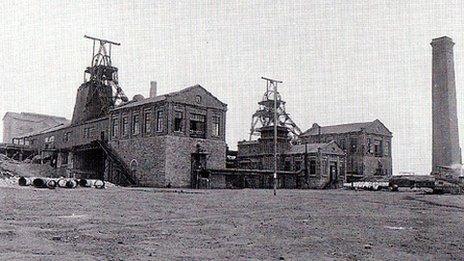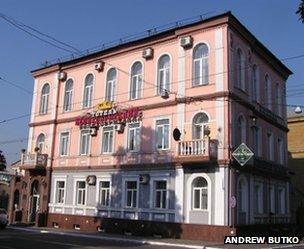Euro 2012: Donetsk founded by Welsh ironmaster John Hughes
- Published
The Ukrainian city where England played France in Euro 2012 owes its existence to a 19th Century Welsh ironmaster.
Donetsk grew up around the works built by John Hughes of Merthyr Tydfil in the 1870s to make plating for a naval base.
The settlement was originally named Hughesovka in honour of the man whose fame had reached Tsarist Russia.
Writer and documentary maker Colin Thomas said of the city: "There's very much a pride in John Hughes and his achievements."
Acclaimed inventor
John Hughes was born in 1815 in Merthyr Tydfil where he learnt his trade from his father, an engineer at Cyfarthfa ironworks.
He later worked in Ebbw Vale and Newport, where he built his reputation by patenting an number of inventions in armaments and armour plating.
The Millwall Engineering and Shipbuilding Company in London was sufficiently impressed to offer Hughes a seat on the board and later a directorship.
The company won worldwide acclaim for its iron cladding of wooden warships for the British Admiralty, with much of the credit going to Hughes.
The company received an order from the Russian Empire for the plating of a naval fortress being built at Kronstadt on the Baltic Sea.
In 1870 Hughes sailed to Ukraine with eight shiploads of equipment and around a hundred specialist ironworkers and miners, mostly from south Wales, to build a metallurgical plant and rail factory.
He also took his wife and eight children to start a new life thousands of miles from home.
Industrial pioneer
The Hughes factory gave its name to the settlement which grew in its shadow, and the town of Hughesovka (Yuzovka) grew rapidly.
In developments reminiscent of the south Wales valleys, a hospital, schools, bath houses and tea rooms were provided for the community, along with a fire brigade and an Anglican church dedicated to the patron saints St George and St David.

The pit heads of Hughesovka were reminiscent of the south Wales valleys
In 1889 Hughes died during a business trip to St Petersburg, and his New Russia Company was taken over by his four surviving sons.
They rapidly expanded the works in the 1890s and again at the outbreak of the World War I in 1914 to produce artillery shells.
The Bolshevik Revolution of 1917 led to the departure of almost all the company's foreign employees, but the works survived and prospered under the rule of the Communists, who renamed the city Stalino.
Known since 1961 as Donetsk, it is now the fifth largest city in post-Soviet Ukraine and still a major centre for coal and steel production.
Celebrating roots
Colin Thomas visited the city in 1991 with historian Prof Gwyn Alf Williams to make a TV documentary about John Hughes, and found little to celebrate the link with the Welsh industrialist.
But Thomas noticed a change when he returned in 2008 to what was now an independent Ukraine to make a radio programme for the BBC.

The VelikoBritaniya Hotel, built in 1883, is one of the oldest surviving buildings in Donetsk
"I'd been about 20 years ago at the tail end of the communist period - there was nothing to commemorate him then," he said.
"Since then they've put up a statue to him - there's some pride now in the origins of the place and its connection with John Hughes."
"The hotel from that period is still there, as well as some of the houses built for the skilled workers who came over from Britain to build Hughesovka."
Mr Thomas added: "When I was there the British Council were running about 24 lectures about the Welsh connection with Donetsk - all heavily oversubscribed."
Ukrainian president Viktor Yanukovych hails from this region in the eastern, Russian-leaning part of the country.
It is also home to Shakhtar Donetsk, one of Ukraine's most successful football clubs, owned by billionaire oligarch Rinat Akhmetov.
The team's £256m Donbass Arena, which opened in August 2009 with a concert by pop star Beyonce, is the venue for England's Euro 2012 group matches against France on 11 June and Ukraine on 19 June.
The 50,000 capacity stadium will also host Ukraine v France on 15 June, a quarter-final on 23 June and a semi-final on 27 June.
In fact the city's role as a host city for Euro 2012 can also be credited to the legacy of John Hughes - its first football team was formed in 1911 as part of the Yuzovka steelworks' sports club.